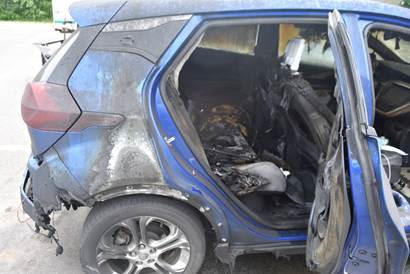The 2019 Chevrolet Bolt EV caught fire in the driveway of state Rep. Timothy Briglin, a Democrat, on July 1, 2021, according to the Vermont State Police. State Police of Vermont According to Vermont State Police, a Chevrolet electric vehicle owned by a Vermont state senator who supports the business recently caught fire while charging in the politician’s garage. The vehicle, a 2019 Chevrolet Bolt EV, is part of a global recall of almost 69,000 electric vehicles that General Motors and the National Highway Traffic Safety Administration notified in November. It’s unclear whether state Rep. Timothy Briglin, a Democrat, brought the Bolt in for recall service. The fire is the most recent example of an ongoing concern among automakers and car safety experts as the industry prepares to unleash a flood of new electric vehicles in the coming years. The environmental benefits of electric vehicles have long been extolled, but the lithium-ion batteries that power them can be deadly and cause major chemical fires if something goes wrong. The origin of the fire, according to the Vermont State Police, “appears to be an unidentified electrical system failure” that started in the passenger compartment near the back seat. The cause of the incident is similar to a handful of other fires in Bolt EVs reported to federal regulators and the firm. GM will look at it. GM said it’s working with local authorities and “will investigate to understand more about the exact situation of this event” in a statement provided to CNBC on Wednesday. The Detroit automaker’s official declined to comment further on the fire, including if the recall repair for the car had been done. Briglin, a proponent of electric vehicles and chair of the state House Committee on Energy and Technology, did not respond to a request for comment right away. Officials from the National Highway Traffic Safety Administration, the local fire department, and the Vermont Department of Public Safety Fire and Explosion Investigation Unit, which investigated the fire, did not immediately reply to requests for comment. According to a press release from Vermont State Police and public records, the fire was reported at Briglin’s house in Thetford, Vermont, about 9 a.m. Thursday. There were no injuries recorded. In November, GM issued a recall for the vehicles due to electrical fires caused by a rare manufacturing problem in some battery modules in vehicles manufactured between 2017 and 2019. It can be fixed by installing advanced onboard diagnostic software in the vehicles, which, among other things, can detect potential difficulties connected to changes in battery module performance before they become problems. To acquire the fix, customers must take their vehicles to a Chevrolet dealer. Concern is still present. Tesla EVs have been among the most high-profile reported fires, including one last week involving a high-performance 2021 Tesla Model S Plaid car. However, when the industry releases a fleet of new electric vehicles in the future years, EV fires are a possible hazard for all businesses. Jason Levine, executive director of the Center for Auto Safety, a Washington, D.C.-based advocacy group, told CNBC that “safety must come first.” “There are still unanswered issues about why lithium-ion batteries in vehicles seem to be catching fire more frequently.” According to a local fire department chief and attorneys representing the driver, this Tesla Model S Plaid caught fire while the driver was at the wheel on June 29, 2021, in Haverford, Pennsylvania. Geragos & Geragos is the source of this information. The lithium-ion batteries that power electric vehicles are exceedingly complicated, and if a malfunction arises or if a high-speed crash occurs, they can cause long-term chemical fires. Traditional vehicles with internal combustion engines can also catch fire, but according to Levine, it’s uncertain whether EVs offer a greater risk. He stated, “There is no good data on this yet.” In terms of collisions, Levine questioned if more fires are being reported simply because there are more EVs on U.S. roads, or if EVs pose a greater risk of fire than vehicles with internal combustion engines. Following incidents of EV fires, the National Transportation Safety Board published a warning last year on the dangers of battery fires in electric vehicles to emergency responders. The NHTSA also published a “Battery Safety Initiative” earlier this year with the goal of collecting and analyzing data on electric vehicle battery safety as well as conducting specific investigations into electric vehicle collision and non-crash incidents involving battery safety. The environmental benefits of EVs “encourage” Levine, but he believes more can be done in terms of processes and rules governing EV safety in the United States. He especially mentioned new European criteria for electric vehicle safety ratings that the US has yet to adopt. He added, “Things is the time to get this properly.” “As both public and private infrastructure invests in the future of EVs and their potential, we as an auto field universe put our hands together to make sure these things are safe, or as safe as they can be.”/n
Read MoreThe Chevy Bolt EV belonging to Vermont lawmaker who backed industry catches fire
2021-07-07T17:34:00-04:00July 7th, 2021|





